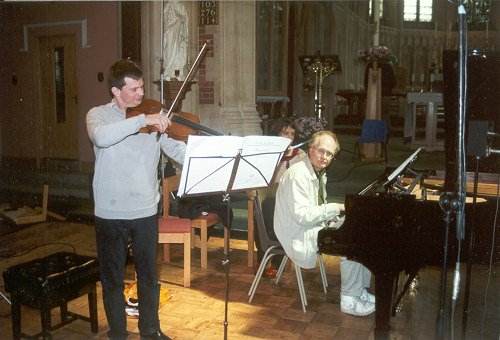A van parked outside a church, usually on a weekday;
men carrying equipment and cables inside; a piano delivered and man-handled
inside; musicians arriving with their instruments. It can only be one
thing: one of the independent record companies has a recording session!
Thus it was recently at All Saints’ Church, East Finchley, a favourite
location for Dutton Laboratories with their on-going series of chamber
music by British composers in their Epoch series. You may remember their
fine recording of Bantock’s music for cello and piano reported on in
January last
year. This time it was York Bowen.

James Boyd (viola)
Bengt Forsberg (piano)
On the morning of Wednesday 1 May, I spent the morning
at Dutton’s recording session in the sympathetic acoustic of All Saints.
Producer Michael Ponder, and engineer Tony Faulkner, were starting the
third and final day of their commission to record the two York Bowen
Viola Sonatas with Bowen’s romantic fifteen minute Phantasy Op 54,
written in 1918. The two Sonatas were already safely in the can,
completed during the first two days, and we spent the morning working
on the fifteen-minute Phantasy and when I left they were well
advanced. This extraordinary passionate piece was quite a revelation,
and in viola player James Boyd’s ardent view of it supported by his
pianist, the Swede Bengt Forsberg, one experienced an involvement not
found in every Bowen performance one comes across. Bowen had indeed
found sympathetic champions, with an enviable fluency in his deceptively
demanding writing.
This is music written for the celebrated viola player
Lionel Tertis, yet again showing what a surprising virtusoso he must
have been in his prime. Bowen’s well made music can bed down into a
bland somewhat Brahmsian contentment if it is not given some fire by
the performers. Even so, this is more technically difficult music than
its approachable surface sometimes suggests, and particularly when Bowen
was in thrall to Tertis he was uninhibited in his technique. Here it
was good to hear players in sympathy with the music and without any
inhibitions in responding to its technical demands. ‘That’s outrageous’
exclaimed producer Michael Ponder, himself an experienced professional
viola player, about a particularly stormy passage, which James Boyd
was throwing off with remarkable fire: it was certainly exciting. ‘Under
Tertis’s influence Bowen certainly takes no prisoners‘ someone remarked
as the high lying semiquavers sailed relentlessly on. This was new territory
for everyone present, and the Phantasy proved to be as much a
discovery as the performers in such repertoire.
The two Viola Sonatas date from well before the First
World War, the second was published in 1911. Both are dedicated to Tertis.
They are part of that remarkable succession of music for the viola by
British composers around the time of the First World War, which includes
the Sonata by Bax and the Suite by Benjamin Dale. Bearing in mind how
many times the Bax Sonata has been recorded now it is strange that Bowen’s
music, from the same stable, is almost unknown. Some readers may remember
that the Bowen First Sonata was once recorded by the Russian viola player
Georgi Bezrukov, issued on a Melodya LP, but that was twenty years ago
and Dutton have certainly found a gap in the market coupling these three
major contributions to the viola repertoire. Every so often one encounters
a new recording whose artists manage to strike sparks of each other
and give unfamiliar repertoire an immediacy and impact so that one is
left wondering how one has existed this long without experiencing it
before. Such a committed and sympathetic team is Boyd and Forsberg and
I shall be very surprised if the electricity evident in the studio on
this occasion is not conveyed onto the finished disc. Forsberg, a great
enthusiast for English music, is, of course, celebrated as a vocal accompanist,
and his sympathy for his duet partner was very much that of the singing
coach.
To the outsider the chief characteristic of such an
occasion is the combination of informality and the immense knowledge
and experience of those involved, though an authority very lightly worn.
Yet although laid back in manner, standards are rigorous and it needs
a special sort of musicianship to sustain playing and enthusiasm over
the time span necessary for the completion of a digital recording, which
can run to many takes, with always the inclination by both artists and
producer for just one more to be sure. Here after a remarkably cogent
play-through of the whole piece, the music was recorded in sections
with much attention to the nuances of intonation and technique. As one
viola player talking to another Michael Ponder’s ‘could you make that
high B-flat even sweeter’ found an immediate response from a player
on top form.
Dutton’s first programme of chamber music by York Bowen,
including the Horn Quintet, has been well received, and they already
have the Bowen Violin Sonatas and Cello Sonata awaiting issue. Now with
the viola music they have consolidated a remarkable revival of a fine
composer which all should find rewarding. Release is scheduled for the
end of the year or early 2003.

